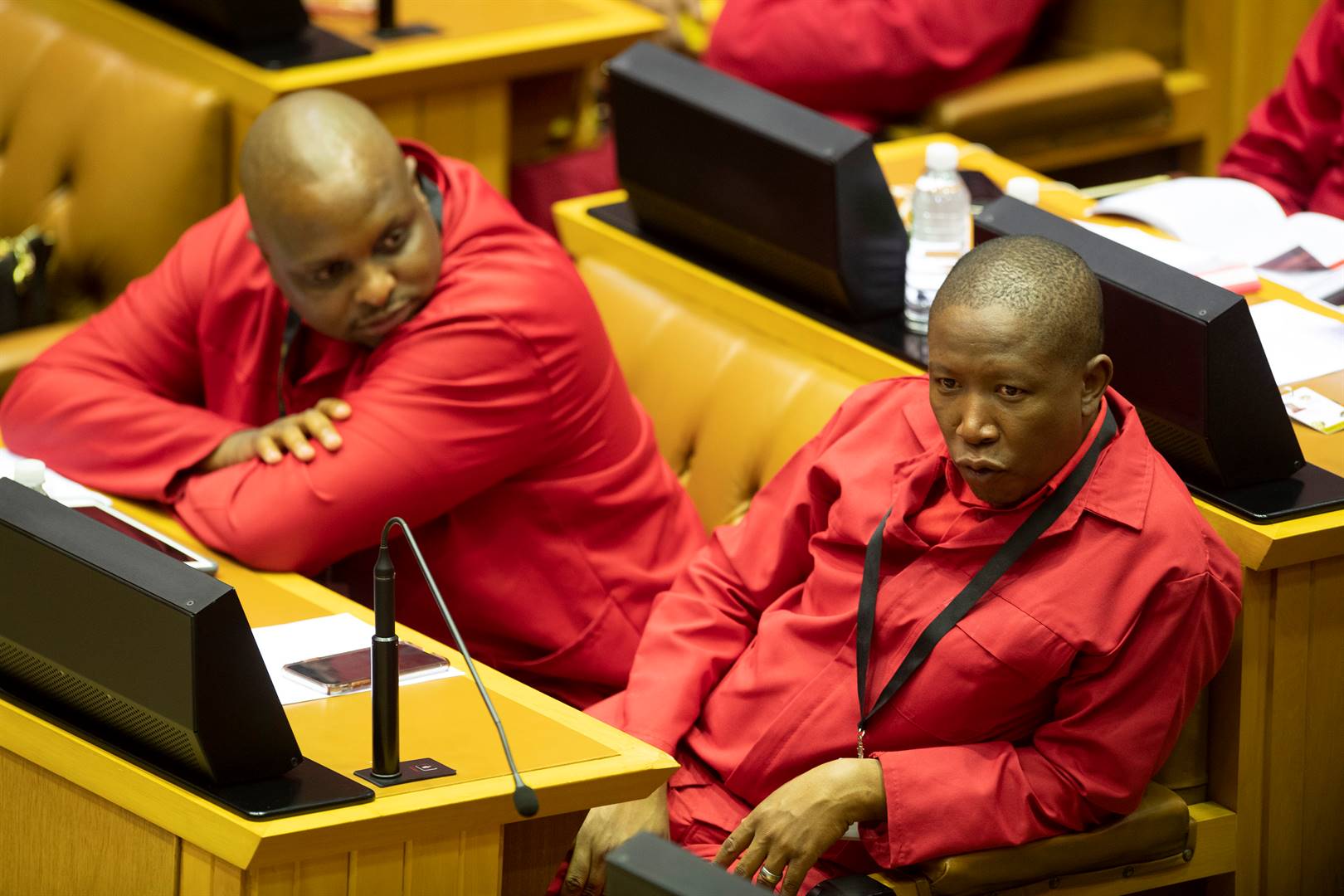
Julius Malema and his deputy, Floyd Shivambu, in the National Assembly. (Jaco Marais/Netwerk24)
Multimedia · User Galleries · News in Pictures Send us your pictures · Send us your stories

Julius Malema and his deputy, Floyd Shivambu, in the National Assembly. (Jaco Marais/Netwerk24)
Multimedia · User Galleries · News in Pictures Send us your pictures · Send us your stories

We should ask ourselves what the main preoccupation of an average member of Parliament in South Africa is. Is it to ensure that a particular investigation takes place so as to benefit the poor? Or, are our MPs worried about defeating investigations that could expose their allies who pay for their houses, writes Ralph Mathekga.
At some point South Africans are going to have to take a hard look at themselves and take responsibility for having allowed political leaders to debase and denigrate the country's institutions, including Parliament.
The evidence presented before our eyes shows that an increasing number of our lawmakers are implicated in wrongdoing or benefiting from proceeds of wrongdoing.
If a significant number of lawmakers in Parliament turn out to be law breakers, then we as a nation should take responsibility as accomplices to the wrongdoing. This is simply because we as a nation decide what is tolerable and what should be punishable in our society.
Reports about the looting of VBS show that our politicians do not see anything wrong from unduly benefiting from the system they are supposed to correct. Both senior EFF and ANC members are respectively implicated in the looting of VBS.
Parliament is supposed to be the cornerstone of accountability; where tough questions are asked to those who exercise power. It appears however that those who exercise power in South Africa are a step ahead, having seen the importance of paying out MPs so they stop asking silly questions about VBS, for example.
Right now Parliament is simply incapable of processing the VBS matter due to the fact that MPs are implicated across the board. Instead of opening a proper inquiry into VBS, efforts are made to filibuster the process and deflect attention by raising counter scandals that need to be investigated.
The standard response that comes from politicians confronted with allegations of impropriety is no longer to deny the fact, but to simply insinuate that others are also doing wrong things that need to be investigated. Put simply, there is always a bigger thief next door.
This has become the story of post-colonial African leaderships; stay out of it and leave my thief to me, I'll sort them out later.
The DA is no exception to all of this, with the party's mayors in Tshwane and Johannesburg respectively engaging in decisions that would undermine the party's stance against wrongdoing. DA leader Mmusi Maimane is now caught in a housing scandal, involving the rental of a house from a businessman under very hazy terms. This means that Maimane can no longer confront EFF leader Julius Malema when it comes to the allegations that Malema lives rent free.
When it comes the residential living arrangements, Malema and Maimane are in the same WhatsApp group; they are even. This would not matter if the two were not the most powerful MPs leading the opposition in Parliament.
At a conference on constitutionalism I attended last week at Stellenbosch University's Institute for Advanced Studies, one Ghanaian professor mockingly suggested that African countries should just democratise corruption because there are no real prospects of doing away with it. Well, corruption is inherently meant to benefit the few at the expense of many. Therefore, corruption cannot be realistically democratised, even if the EFF, the DA, and the ANC tried to democratise it among themselves.
One thing that always preoccupy my mind when I look at the phenomenon of corruption is that it has a peculiar way of infesting institutions of democracy in post liberation societies such as ours. In our society, corruption exists within the political economy of distribution. Those who attain undue benefits often argue that it is their turn to eat, and their followers should just shut up and wait for their turn as well. The reality is that the cake is never big enough to sustain an equitable share of corruption proceeds.
We should ask ourselves what the main preoccupation of an average member of Parliament in South Africa is. Is it to ensure that a particular investigation takes place so as to benefit the poor and vulnerable? Or, are our MPs worried about defeating investigations that could expose their allies who pay for their houses and other trinkets?
Looking at the current composition of Parliament, we should ask the basic questions about whose interests are our MPs concerned about when they first wake up in the morning.
- Dr Ralph Mathekga is a political analyst and author of When Zuma Goes and Ramaphosa's Turn.
Disclaimer: News24 encourages freedom of speech and the expression of diverse views.The views of columnists published on News24 are therefore their own and do not necessarily represent the views of News24.